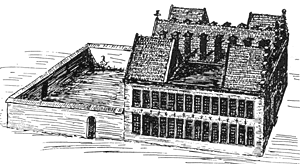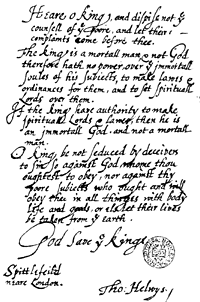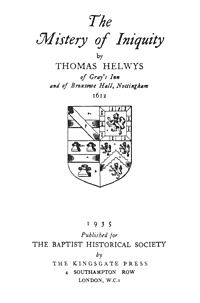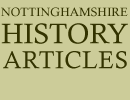The story has often been told how the debates convinced the Nottingham group that covenanting together was not a Scriptural method to form a church, so that they dissolved, and began again with believers' baptism. Smyth baptized himself, then baptized Helwys, and they baptized their comrades. They were at once challenged on many grounds, especially why they had acted so independently, without seeking baptism from the Dutch Mennonites, who for eighty years had been in Amsterdam, maintaining much the same principles. The fact was a surprise to them, but it quickly emerged that their landlord was one of these people, and they at once proceeded to explore the situation. Many were delighted to find new friends, and presently proposed to join the New Frisian or Waterlander church in Amsterdam.
But Helwys disagreed. He was struck by the Dutch claim that there ought to be orderly transmission, elders ordaining elders, baptism to be received only from people already baptised, but he was not at all disposed to acquiesce in the necessity of Succession, which was a stronghold of the Catholics, and therefore in his eyes, anti-Christian. In the temper of the time and place, the difference led to a new division. For the Mennonites themselves had broken into three groups, the differences being mainly as to discipline; and the English were dividing on all manner of issues. It were unprofitable to tell again the whole story, even though the issues raised were so important. It must suffice to state, without justifying, the path that Helwys followed, after separating, with others, from Smyth and the main group. He revised the Confession of Faith which Smyth had framed for the undivided church, and published it. The "ancient church" of Londoners in Amsterdam had published their Confession in Elizabeth's time, and it was desirable to have a similar Baptist Confession in print.
Having thus shown things in perspective, without much argument, he advanced to special publications on particular points. The first was on God's Decree. Calvin had put this in the forefront and had made it regulative in his scheme of thought. He had soon been challenged in England by an Anabaptist, Robert Cooke, who had argued at length that men who believed God had eternally and irrevocably decreed the destiny of each man, would feel no moral responsibility, but would be desperately careless. Now Cooke had printed his criticism, and as he was a courtier of Edward VI, it is possible that Helwys had seen it in London. He certainly adopted his arguments, and even some of his phrases. Since Cooke's day, Calvin's views had been popularized by the English Genevan Bible, read in English homes, Scottish homes, Scottish churches; and although the influence of Hooker was slowly forming another school, yet most bishops and clergy, and kingjames, were staunch Calvinists. And in Holland, a protest like Cooke's, made by professor Arminius, was causing grave trouble. Helwys therefore repeated Cooke's protest, and added a new point with a new corollary. He pointed out that Christ redeemed all men, and he inferred that infants were not condemned. This second book he dedicated to an old and influential friend, Dame Isabel Bowes of Coventry. Her marriage had linked her with the Knoxes, and as John Knox had been called on to refute Cooke, it was most fitting to dedicate this work to her. What view she took we do not know, and probably her husband's speedy death distracted her attention.
Next Helwys felt called to address the Mennonites, especially that section with which he had had contact, the New Frisians. The four special points here emphasized were, that Christ had a true earthly natural body, that a day of rest was to be kept holy each week, that Succession and Privilege in holy things did not exist, that magistracy (being ordained by God) did not debar from church-membership. Helwys saw such differences between himself and even this liberal school of Mennonites that he could not enter their fellowship or even regard them as sister churches.
Finally, he addressed the Church of England, especially its governor, king James. Some of the reformers in Suffolk, with whom he had some correspondence, had written to object to flight in persecution - a policy discussed by Tertullian, and doubly illustrated by Cyprian. Helwys was convinced, and came to the conclusion that it was his duty to return and bear witness to the truth. His view that the Church of England was the mystery of iniquity spoken of by Paul, was common among Separatists. His conception of his duty to proclaim this in exactly the relevant quarter was somewhat original, for Barrowe and others had only stated it under cross-examination as prisoners. Helwys decided both to publish, believing in the power of the press, and also to go in person and approach the king, who had the power to reform and delighted to exercise his power. The step was logical, and heroic.

32 Jan Munter's Bakehouse on the Amstel.
It was not absurd. Helwys belonged to a class which had access to the court; he had seen Elizabeth in the hall of his Inn; Francis Bacon was in higher favour than ever; his cousins were in the same circle. He could easily get access to the king, and "dare and challenge King and State to their faces".
There were points he could make. In various parts of the continent there was toleration of diverse opinions; Transylvania, Poland, France with its edict of Nantes; in the Netherlands there was not even an established Church, much as the Dutch Reformed sought establishment. James might see the incongruity of one form of government being established in Scotland, and another in England; he might be convinced that the solution was not uniformity, but disestablishment, liberty of conscience.
Recent events as to trials for heresy might give Helwys pause, yet on careful consideration would encourage him. There had been three brothers, Legat, Separatists, of whom Walter had been drowned at Old Ford when washing himself - query, baptizing? Thomas had been thrown into Newgate for heresy, and had died there about five years before. Bartholomew had been condemned, and burned in Smithfield this very year, 1611/2. There was another man, Edward Wightman - was he the Edward Wightman who entered Gray's Inn, 1595? He was tried for heresy and blasphemy from April to December 1611, was condemned, and was burned at Lichfield in April 1612. The bishop of Norwich wished to deal in the same way with William Sayer, and wrote to archbishop Abbot. There came a careful reply, that heretics who denied something expressly contained in the three creeds or the four first general councils might indeed be burned; but in the case of those who merely held the doctrines of the Barrowists and Separatists and Anabaptists, it would never be assented to that a man should be fried at a stake. Though Helwys did not know this private letter, he could gauge as well as Abbot that public opinion would no longer tolerate burning for such causes. And therefore in a legal sense, his chief risk was imprisonment till he recanted, with banishment as the ultimate penalty. And what was that to him, who had already thrown up Broxtowe?
He had done with his Tarsus, for Nottingham had had their witness; his Damascus, where he had seen a great light, had no special claim on him; but his Jerusalem, where he had sat at the feet of a great master, called him for his testimony. To London he set his face, that in the great capital he might, with his dozen men and women, preach boldly in the name of the Lord.
He did not choose Gray's Inn Lane, nor the city where his uncle Geoffrey had now been sheriff: his cousin Gervase was about to become Lieutenant of the Tower. North of Tower Hamlets, the fields of St. Mary's Hospital were being developed; part were fenced in for the Honourable Artillery Company, but much open ground remained, on which a few houses were rising. To Spitalfields he led his church; and the district might well claim a Baptist pilgrimage to-day; for many other associations have enriched it; but it stands unique as the home of the first Baptist church on English soil.

He penned in a copy of his book, still to be seen, and now reproduced in facsimile, a direct appeal to king James that he would accord full liberty of conscience. And with his many friends at court, he would have no difficulty in presenting it in person.
He was too sanguine. James was as determined as ever to concede nothing to anybody. He resisted every constitutional adviser, he dissolved parliament after parliament that claimed civil liberty; he would not dream of granting ecclesiastical liberty.
The bold petitioner soon felt the weight of his hand. For the rest of his life, Spitalfield was no longer his home, but that Newgate through whose portals he had often passed in youthful days. And while public attention was engrossed by the change of ministers, court wedding and death and scandal, his case passed with as little notice as that of scores of predecessors. We do not know the exact date of his imprisonment, nor that of his deliverance by death; only that when Geoffrey Helwys died in 1616, a legacy was left to Joan, the widow of Thomas.
But from an unexpected quarter we have a very graphic picture of the condition of those who were under the claws of the Black Dog of Newgate. It was sold at the gate of Gray's Inn in 1612, and it shows that Helwys would have his testimony welcomed. As too the Ordinary of the prison earned such praise, we may hope that the last months of the prisoner's life were cheered by a congenial soul.
See in yon Hall are divers sorts of men, Some weep, some waile, some mourne, some wring their hands, Some curse, some sweare, and some blaspheming. Then My heart did faint, my head hiare upright stands, 0 Lord, thought I, this house will rend in sunder, Or else there can be no hell, this hell under.
Thus wondring, I on suddaine did espie One all in black came stamping up the staires, Whose yon, I aske. And thus he made reply, Yon is the man doth mitigate our cares. He preacheth Christ, and doth God's word deliver To all distrest, to comfort men for ever.
Then drew I neeare to see what might betide, Or what the sequell was of that I saw: Expecting good would follow such a guide, As preached Christ, and taught a God to knowe. A hundred clustered nying the pulpit neare, As if they longed the Gospellfor to heare.
Thus ebbed away the life of Thomas Helwys. He was barely forty years old, and he seemed to have failed. It is said that for a drowning man, all his career is recalled in a few seconds. Suppose instead that he had a vision of the future for forty years ahead; what would he see?
Nottingham. King Charles declaring war on his people, unfurling a standard - to be blown down that night. The king surrendering to the Scots army at Newark, sold, captured, imprisoned, tried, condemned, as having broken his coronation oath and infringed his people's liberties; the death-warrant signed by the Baptist governor of Nottingham, John Hutchinson.
Gray's Inn. William Steele, M.P. for London, lord chancellor of Ireland, a Baptist.
Coventry. A Baptist church evidently due to the book he sent to Dame Isabel Bowes; one member returning home to Radnorshire, and founding there Baptist churches which leavened mid-Wales.
Trent Valley. Baptist churches gathering in both Helwys counties, and linked in an Association sending forth evangelists.
Amsterdam. Divisions healing, a meeting-house rising to show in its walls the names of English and Dutch.
Spitalfields. His church moved into the city, sending evangelists to the Severn, throughout Essex and Kent, preaching in Rochester Cathedral, founding churches at Canterbury and along the coast.
Theobalds. A Baptist colonel, Packer, on the board which tried the efficiency of all public preachers, and gathering a Baptist church to meet within the palace bought from the Cecils by King James.
Charterhouse. From the school, Roger Williams in New England, founding there the first Baptist church overseas. In the Master's Lodge, another Baptist, Edward Cresset, sitting with Packer of Theobalds to ensure that ministers should be godly. Just outside its walls, another Baptist church gathered by a printer and bookseller, linked with his own church in its evangelistic campaign.
Newgate. From its grated window was to be seen High Hall, where another Baptist church was to worship, led by a man destined to be chemist to the grandsons of king James.
If such a vision might bring content, what would it be should his gaze pierce the centuries?
1775. The Stuarts gone, freedom secured. His one church multiplied sixtyfold, colonies in that Virginia founded by Ralegh, in New Amsterdam re-named New York after the grandson of James, in Providence where the second Charles had granted full religious liberty at the request of Roger Williams, in Carolina named after him. At Madras, the chief officer of the East India Company a Baptist, presenting Christ to be muftis of Islam, founding schools to train children in His ways.
1815. To the East; from Nottingham had gone forth the cry, Expect great things from God, Attempt great things for God. At Serampore great things were being achieved, and the Bible was going forth in many tongues. To the West; a new republic, whose fundemental law had borrowed direct from Baptist practice the rule that conscience was free. In Jamaica, churches founded by a negro from Georgia had appealed to England for guidance; and Bristol, which had too often sent slavers, had sent a pioneer of those who would free the slaves. In the heart of the Helwys country at Gamston, a young man had been baptized, who had settled hard by Spitalfields and had rallied all the evangelicals of Helwys' school to an advance, soon to be sustained by a college to train evangelists, within a mile or two of Broxtowe Hall.
1915. The little one has become a thousand. In London and Berlin and Philadelphia and Stockholm have gathered men and women from fifty nations, representing more Baptists than all the subjects of King James.
If these glimpses could have come to the prisoner of Newgate, it would not be contentment, but triumph. He might happily say with Simeon, "Lord, now lettest Thou Thy servant depart in peace, according to Thy word, for mine eyes have seen Thy salvation which Thou has prepared before the face of all peoples, a light to lighten the nations."
Shortened Pedigree

Robert Elwes of Askham, died 1526. William Ellwes, died 1557.
1. Edmund Helwys of Broxtowe Hall, died 1590. Thomas Helwys of Broxtowe Hall, Bilborough; entered Gray's Inn 1592/93, married Joan Ashmore 1595, emigrated to Amsterdam 1608, returned to London 1612, was committed to Newgate, died before his uncle Geoffrey 1616.
2. John Helwys of Askham, Saundby and Worlaby; Jervies Helwis, christened 1561, Cambridge and Lincoln's Inn, knighted at Theobalds, 1603, lieutenant of the Tower 1613, executed 1615.
3. Thomas Helwys of Habblesthorpe, died 1607. Thomas Elwes, entered Gray's Inn 1597.
4. Geoffrey Helwys, 1541-1616; alderman of Farringdon Within, sheriff of London 1607.
Henry Helwys, entered Gray's Inn 1600.
[This pedigree is shortened from that constructed by the Rev. Walter S. Burgess, B. A. of Plymouth, which was published 1912 in the Transactions of the Baptist Historical Society.]
